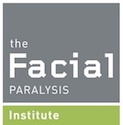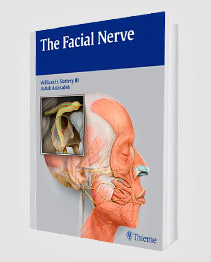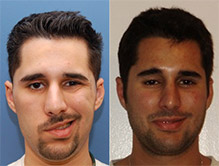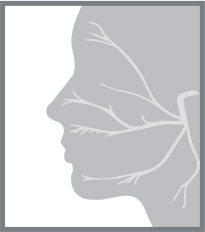
Bell’s Palsy Eye Treatment Options: From Lubrication to Temporary Patching
When Bell’s palsy strikes, your inability to close your eye properly becomes one of the most immediate concerns. This neurological condition affects the facial nerve, leaving you unable to blink or fully close your affected eyelid. Without proper treatment, your eye becomes vulnerable to serious complications that could threaten your vision. The good news? Several […]
Read more
Face Muscles and Facial Paralysis: Understanding the Science Behind the Smile
Your smile is one of your most powerful forms of communication, but behind that simple expression lies a complex network of muscles working in perfect coordination. When this intricate system is disrupted by facial paralysis, the impact extends far beyond appearance. Key Takeaways The Anatomy Behind Every Expression Face muscles differ fundamentally from other muscles […]
Read more
Mild Bell’s Palsy Surgery Before and After
Bell’s palsy affects thousands of people every year—often with no warning and no clear cause. While many recover fully within weeks or months, some are left with lingering effects like facial tightness, asymmetry, and involuntary muscle movements known as synkinesis. For these individuals, selective neurolysis offers a promising surgical solution. This article explores the before […]
Read more
Selective Neurolysis Surgery Before and After
If you’ve ever dealt with a crooked or tight smile after Bell’s palsy or facial nerve injury, Selective Neurolysis Surgery might sound like a mouthful. But basically, it’s a targeted fix where the surgeon finds and eases the nerve fibers that aren’t playing nice. You’ll meet your doctor first, get a quick nerve map, and […]
Read more
Facial Nerve Surgery In California
Facial paralysis can drastically affect how you look, communicate, and feel about yourself. It can interfere with basic expressions—smiling, blinking, or speaking clearly. For patients facing these challenges, finding the right surgical team is vital. Fortunately, California is home to world-class facial nerve surgeons and institutions that specialize in restoring movement, symmetry, and confidence. At […]
Read more
Bell’s Palsy Surgery Guide
Understanding Bell’s Palsy Dealing with Bell’s Palsy can be really tough. It’s a condition where your face gets weak or even paralyzed on one side. Sometimes, it gets better on its own, but other times, it sticks around and can make everyday things hard. When the usual treatments don’t quite cut it, surgery might be […]
Read more
Types of facial Nerve Injuries & Treatments
When your face doesn’t move like it used to, it can be pretty unsettling. This usually happens because of something called a facial nerve injury. These injuries can range from minor issues that get better on their own to more serious problems needing a lot of medical help. Knowing about the different kinds of facial […]
Read more
Facial Nerve Paralysis: Decompression Surgical Options
Facial nerve paralysis can really mess with a person’s life, making it tough to do simple things like smile or blink. When this happens because the nerve is squeezed, decompression surgery might be an option. This article will walk you through the different ways doctors can relieve that pressure, helping folks get some of their […]
Read more
Best Facial Paralysis Treatments To Know About
Dealing with facial paralysis can be really tough, affecting how you look, how you talk, and even how you eat. It’s not just about appearance; it can mess with your daily life in big ways. Luckily, there are quite a few ways doctors can help. This article will go over some of the Best facial […]
Read more
Facial Reanimation Surgery Explained
Facial paralysis can be a tough thing to deal with. It can mess with how you look and even how you do everyday stuff, like eating or blinking. But good news! There are operations, called Facial Reanimation Surgery Explained, that can really help. These procedures aim to get some movement back in your face or […]
Read more
Facial Reanimation Surgery Cost Breakdown
Facial paralysis can deeply affect how a person moves through the world. Beyond cosmetic changes, it can alter basic emotional expression, confidence, and social interactions—making the decision to pursue facial reanimation surgery both personal and life-shifting. Key Takeaways What Is Facial Reanimation Surgery? Facial reanimation surgery restores movement to the face when facial nerves or […]
Read more
Cross Facial Nerve Graft – What Is It?
Facial paralysis can drastically affect a person’s confidence, function, and emotional expression. One specialized surgical technique that helps restore movement is the cross facial nerve graft (CFNG), often recommended when facial nerves are no longer able to signal muscles effectively. Key Takeaways The CFNG procedure is primarily used to treat long-term facial paralysis. It transfers […]
Read more
Is Bell’s Palsy Permanent?
Waking up to find one side of your face drooping can be terrifying. Bell’s Palsy often arrives without warning, leading to fear, confusion, and immediate concern about whether the condition will be permanent. Key Takeaways Understanding Bell’s Palsy Bell’s Palsy can come on suddenly, making part of your face feel weak or even paralyzed—usually just […]
Read more
Financing Options For Facial Paralysis Surgery
Facial paralysis affects more than just appearance—it can deeply impact confidence, how you communicate, and how you function day to day. While facial reanimation and reconstructive procedures provide a path to recovery, they often come with significant financial burdens. Insurance may only partially cover the expenses, leaving patients to navigate high out-of-pocket costs. Key Takeaways […]
Read more
Is Facial Paralysis Surgery Covered By Insurance?
Is facial paralysis surgery something your insurance plan will actually cover? It depends on your diagnosis, your policy, and whether the procedure is considered medically necessary. Let’s walk through what you need to know to make sure you’re financially and medically prepared. Key Takeaways When Is Facial Paralysis Surgery Considered Medically Necessary? Insurance companies often […]
Read more
How Lyme Disease Can Affect Facial Nerves
Could a tick bite really trigger facial paralysis weeks after the fact? If you’ve been diagnosed with Lyme disease and are starting to notice facial muscle weakness, there’s a real possibility your nerves are involved. Understanding that connection—and getting expert care early—could make all the difference. Key Takeaways Understanding Lyme Disease and Its Impact on […]
Read more
Bell’s Palsy and Permanent Eye Damage
Facial paralysis patients often struggle to make facial expressions, as well as chew, swallow and speak. In some instances, facial paralysis patients also experience ophthalmoplegia, also referred to as eye paralysis. Eye Paralysis: Here’s What You Need to Know Ophthalmoplegia can affect one or more eye muscles. It has been linked to several medical conditions, […]
Read more
Bell’s Palsy Impact On Depression
Facial paralysis isn’t just a medical issue—it can be deeply personal and emotionally complex. For many living with Bell’s Palsy, the visible changes to their face come with unseen mental health challenges, especially depression. Key Takeaways The Psychological Toll of a Physical Condition Bell’s Palsy results in a rapid loss of muscle control on one […]
Read moreWhat To Know About Reanimation Surgery for Facial Paralysis
Facial paralysis can make simple movements like smiling or blinking difficult. Reanimation surgery helps restore function by reconnecting nerves or transferring muscles to regain movement and expression. Key Takeaways What Is Facial Reanimation Surgery? Facial reanimation surgery is performed to restore movement in a paralyzed face. It helps patients regain control of their expressions and […]
Read moreSurgery for Acoustic Neuroma – What To Know
Acoustic neuroma surgery removes a noncancerous tumor on the nerve that affects hearing and balance. This procedure can prevent complications but may impact facial and hearing function. Key Takeaways How Is an Acoustic Neuroma Removed? Surgery is the most effective way to remove an acoustic neuroma. The approach depends on tumor size, symptoms, and hearing […]
Read moreMost Common Facial Nerve Damage Treatments
Facial nerve damage can cause pain, weakness, and loss of function. Some cases heal with time, while others need medical intervention. Understanding treatment options can help you find relief. Key Takeaways Can Facial Nerve Damage Be Repaired? Nerves can heal, but it depends on the type and extent of the damage. Mild injuries might recover […]
Read more
Ramsay Hunt Syndrome vs Bell’s Palsy
Facial paralysis often catches people off guard, and it can be scary when it happens. Knowing how Ramsay Hunt Syndrome and Bell’s Palsy differ gives both patients and doctors a better shot at choosing the right path forward, fast. Both conditions involve the same nerve but carry very different risks. While Bell’s Palsy is more […]
Read more
Transconjunctival Blepharoplasty – What Is It?
Transconjunctival blepharoplasty is a modern, minimally invasive eyelid surgery technique that’s becoming increasingly popular for its subtle results and quick recovery. Unlike traditional methods, which involve making an incision along the eyelid’s natural crease, this approach is performed from inside the eyelid, leaving no external scars. It is highly effective for addressing puffiness or bags […]
Read moreRequest your consultation with Dr. Azizzadeh today
Call us at (310) 657-2203 to schedule an appointment.
Schedule a Consultation




